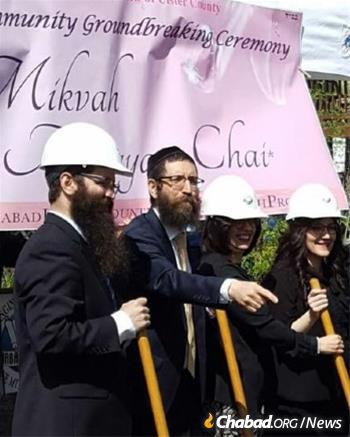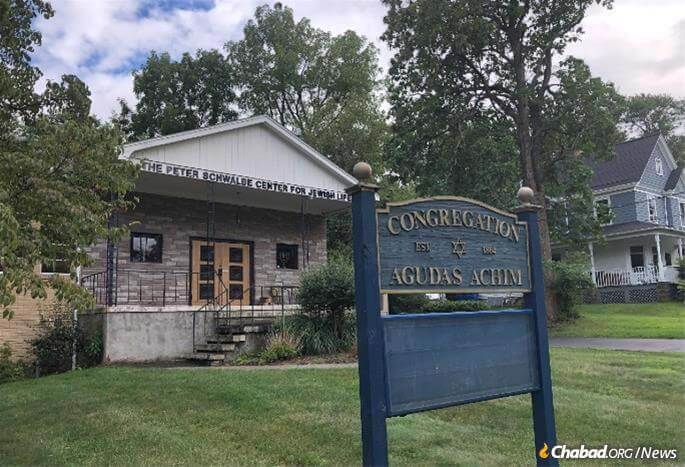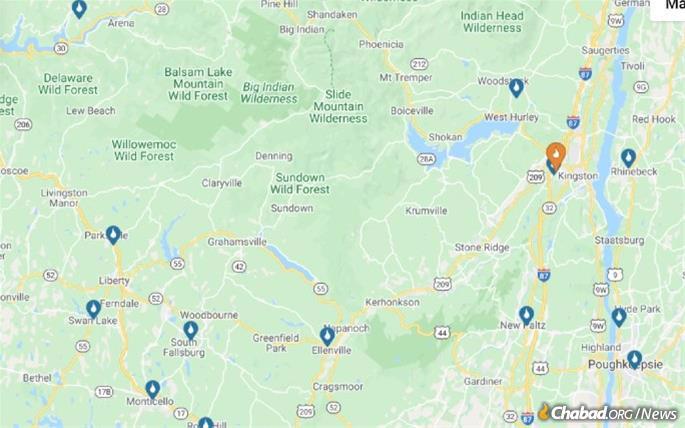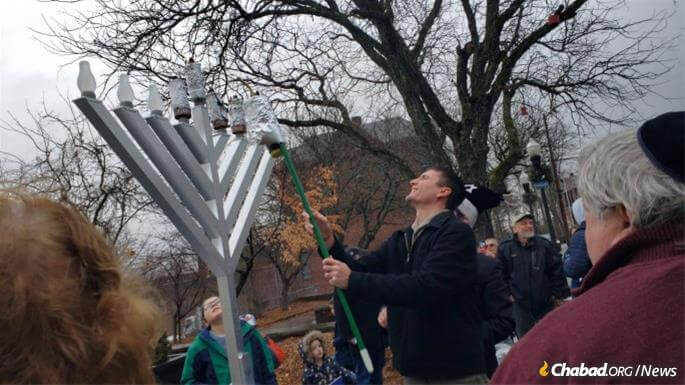Howard recently joined the Board of Directors of FIN, the Faith Inclusion Network.
Supporting people with disabilities in our faith communities.
Here is the video introducing me:
Howard recently joined the Board of Directors of FIN, the Faith Inclusion Network.
Supporting people with disabilities in our faith communities.
Here is the video introducing me:
Original Article Published On The Chabad.ORG
KINGSTON, N.Y.—Rabbi Y. Yitzhak Hecht’s sense of humor is as admirable as his sense of determination. When I arrived at Congregation Agudas Achim, he greeted me enthusiastically and playfully with his smartphone in hand, ready to capture my reaction when he introduced me to my namesake, longtime shul member Howard Blas.
“Howard Blas, meet Howard Blas!” exclaimed the rabbi as we moved along into the congregation’s library and beit midrash, where the he shared news of a state-of-the-art mikvah set to open on Oct. 24, offered updates on daily Torah classes he conducts online with other Hudson Valley rabbis and enthused about the ongoing expansion of Chabad of Ulster County—just 90 miles (145 kilometers) north of New York City and 60 miles (95 kilometers) south of Albany.
When Hecht first walked into the synagogue 20 years ago, just a few days after the terrorist attack on Sept. 11, 2001, the once-thriving 137-year-old Orthodox synagogue had fallen on hard times. The city and its Jewish community had been decimated by the departure of its biggest employer six years earlier. Only two people attended Simchat Torah services the year before, and the shul had six rabbis in seven years, recalls local potter and artist Howard Vichinsky.
But the congregation found the hard-working and good-natured rabbi and his wife, Leah, irresistible, and they have been serving and helping grow the community ever since. Their own family has grown as well with seven of their eight children natives of Kingston.
Today, with more people than ever before working remotely, Kingston is becoming a destination for Jewish families in search of open space, good air quality, scenic views, small-town warmth, culture and access to Jewish life. The quaint city on the west bank of the Hudson River has an area of 8.6 square miles and 1.3 square miles, and is about a two-hour commute from New York City.

The Ups and Downs of a Hudson Valley City
Kingston has had many ups and downs in its history, briefly serving as New York State’s capital in 1777 before it was burned to the ground by the British. The city flourished in the 19th century when natural cement was discovered in the area, and with its proximity to the Hudson River and connection to the transcontinental railroad system, it became an important transportation hub.
Jewish families began to settle in the city; in 1864, Congregation Agudas Achim was established by Jewish immigrants from the city of Amdur in Belarus. In the early 20th century, Kingston’s coal and cement industries began to decline. Small machine manufacturing and garment production soon grew, followed by the biggest boom in the city’s history: the arrival of IBM.
In 1954, the computing giant built a 2.5 million-square-foot factory and research center in Kingston and employed more than 7,100 workers at its peak, making up as much as 30 percent of the local economy.
In 1995, IBM abruptly closed its doors and left the city, abandoning the factory. Thousands of people were impacted, and many simply left.
Blas, who has served as shul president four times, worked for IBM for four years. His in-laws have been connected to Kingston and to the Jewish community there for decades. His wife’s grandparents were members, and his daughter is the fifth generation to be davening here, Hecht tells Chabad.org. They have experienced Kingston’s ups and downs firsthand.


Roots in the Community
The Hechts have roots in the area that date back to the rabbi’s childhood. In 1953, his grandparents, Rabbi J.J. and Rebbetzin Chava Hecht, founded Camp Emunah in Greenfield Park, N.Y. Camp Emunah is the first girl’s overnight camp in the world of Lubavitch. The Rebbe—Rabbi Menachem M. Schneerson, of righteous memory—personally visited the camp. Of the three times the Rebbe travelled outside of New York City after ascending to the leadership of Chabad-Lubavitch, all three were to Camp Gan Israel and Camp Emunah.
Howard and Renee Vichinsky moved from Brooklyn to Kingston in 1983 and have been actively involved since 1984. “I have been president for the last 26 years and gabbai for seven years,” reports Howard proudly. He, too, experienced Kingston’s ups and downs and worked hard to keep the shul going.
He observes, “over time, things change in a rural community. Kids go to college and don’t come back. Jewish farmers no longer farm. Businesses close. By the late 90s, we were in low tide.” He pointed out sadly, “One Simchat Torah, me and another guy—we danced with the Torah.”
Vichinsky also emphasized the toll that IBM’s closing had on the community. “Losing 4,000 jobs in a community of 24,000 was a lot. The community took a big hit.”

‘There are Reasons Why We Don’t Have a Rabbi’
As the community’s numbers dwindled, Vischinsky approached a rosh yeshivah in Monsey, N.Y., who agreed to send rabbinical students every other week to keep the shul alive. This arrangement went on for several years.
“In 2001, Rabbi Hecht knocked on my door and said, ‘I’d like to be the rabbi of the shul.” I explained, ‘There are reasons we don’t have a rabbi.’ Vichinsky was intrigued with Hecht’s unusual offer, acknowledging that “the congregation was a little nervous. They had no familiarity with Chabad. We took a chance, and it has been a wonderful partnership. It was the right combination. It is Chabad’s mission to bring in and bring Jews back to tradition. I have been very happy!”
Vichinsky details some of Hecht’s additional accomplishments, including the Jewish Summer Fellowship. “Ivy League Torah Study—a woman’s summer Torah-study program—needed a home, so we cut the social hall in half and made seven rooms.”
Seven beautifully furnished guest rooms are used regularly by visitors to the community. “There is a very good head trauma center in Kingston, and family members have stayed over several times. Or people who want to spend the High Holidays out in the country stay here.”
Vichinsky, a self-described baal teshuvah, enjoys learning and appreciates the many classes Hecht and other Chabad rabbis in the area give. “For me, it is an important part of my life.” Vichinsky participated in an earlier learning initiative of Hecht’s—a 10-year weekly study of the entire Kitzur Shulchan Aruch, the popular abridgement of the “Code of Jewish Law” authored by 19th-century Rabbi Shlomo Ganzfried. Their efforts were celebrated in a communal siyyum (completion ceremony) in 2016.

A Daily Connection That Will Survive the Pandemic
Hecht has built an extensive learning program that involves other area shluchim and has continued virtually during the coronavirus pandemic, including Rabbi Mendy Karczag of Chabad of Woodstock, Rabbi Moshe Plotkin of Chabad of New Paltz, Rabbi Avrohom Itkin of Chabad of Greene County and Rabbi Shlomie Deren of Chabad of Ellenville. “Daily Connection classes were at 9 a.m. and 9 p.m.—every 12 hours,” Hecht noted proudly. He invited the Woodstock rabbi to teach Tanya on Mondays, and the New Paltz rabbi to teach about holidays on Tuesdays. Hecht leads a “Shmooze with Friends” class on Wednesdays, and Rabbi Yaakov Raskin teaches parsha on Thursdays.
Hecht is proud of the learning program he has designed and built. “It is here to stay, no matter what, even after the pandemic.” And it reaches far beyond Kingston. Hecht references a member of the community who recently relocated to a small town in Mexico, noting that “she has her Yiddishkeit and community because of this.”
Vichinsky and Hecht speak with excitement about the mikvah, which will soon serve the community. Hecht has also helped expand the Chabad shluchim presence in Kingston and in Ulster County, noting that now “my sister and brother-in-law are here in Kingston. My brother and sister-in-law are 20 minutes away in Rhinebeck. And more young people are coming here.”
In addition, there has been a Chabad presence on the SUNY New Paltz campus—14 miles to the south—since the Plotkin family arrived 17 years ago. Vichinsky notes that “they do wonderful work with the college students. It gives them a religious alternative in a liberal college.”
Hecht has seen a shift in Kingston’s Jewish community over the years, “from mostly 50-year-oldplus adults who attended shul mostly on the High Holidays to younger singles and married couples in their upper 20s and 30s.”
He notes another important sign of growth—the fact that “we are slowly finding more kosher products in the stores.” Kingston isn’t far from major Jewish population centers with extensive selections of kosher food; both Monsey and Albany are an hour away.
The local Chabad shluchim have also found a creative solution for helping their children receive a Jewish education. “Four shluchim families drive their kids each day to Albany,” reports Hecht.
Families relocating from urban areas are already finding Kingston to be a desirable destination. Vichinsky has already noticed that “some families left the city during Covid and came to Kingston. It is touted as a place to be.”
Musician Ellie Macias had been planning to relocate from Brooklyn to Kingston even before the pandemic. In 2018, as their children got older and some were already out of the house, he and his wife purchased a house in Historic Hurley. They completed renovations just before March 2020. “Being in nature was very attractive.” Macias noticed a movement of others seeking an “alternative lifestyle and wanting to be in nature.”
Kingston’s cultural life also appealed to Macias. “There is a movement of musicians to the Hudson Valley. It has become a center for musicians.” Macias, originally from Gibraltar, studied Ladino Flamenco and jazz guitar at the Berklee College of Music in Boston. He now has a recording studio in his house.
Macias has noticed some young couples moving into town and feels there is “potential for more people to start to come.”
He acknowledges that the marketing of a shul can be a challenge. But he credits Hecht for his ongoing efforts to grow the community. “They are a great team, and they are amazing shluchim in terms of how much they give of themselves. They know everyone and genuinely enjoy chatting with everyone,” says Macias.
Macias is particularly pleased by the thriving congregation, as he has been saying kaddish daily this year in the synagogue thanks to the minyan there.
He also sees great potential in the future of Kingston as a whole: “It is a well-kept secret but once people know about this ideal lifestyle, they will come.”
Vichinsky feels the secret is already getting out. “Chabad in the Hudson Valley has grown exponentially over the last decade,” he says. As Hecht steps back and reflects on what the shluchim families have accomplished thus far in Ulster County, he reports: “This is what the Rebbe wanted from us—to see and feel a need, and to fill the needs of the community.”
Original Article Published On The eJP
By Helen Chernikoff
As a longtime administrator in the field of disability services, Avrohom Adler had gotten countless phone calls from people in the Jewish community seeking a service provider either on their own behalf, or for a family member or friend. He would do what he could to help them, but his inability to know the outcome nagged at him. Spurred by those experiences, he’s created a database, under the auspices of the Orthodox Union’s (OU) Yachad division, that aims to provide a central address for high-quality referrals, Adler told eJewishPhilanthropy.
“This has been something that I personally have been thinking about for 10 years,” said Adler, Yachad’s international director. “Any organization that provides supports for people with disabilities deals with this. You try to do your best, but there’s no way to follow up.”
Called REACH, the service will initially serve the New York region, although Yachad, which means “together,” plans to expand it to cover the United States. It will offer recommendations for government-funded programs, educational institutions, social and recreational programs, therapists, lawyers, advocates and social workers. Yachad draws on the entire Jewish community in compiling its database, in addition to non-sectarian organizations, such as JCCs, the Rebecca School, located in Manhattan, and Brooklyn’s Strivright/Auditory Oral School of New York.
“This is not a Yachad network,” Adler said of REACH. “This belongs to the community.”
REACH’s director spent a year researching the community’s offerings in order to create the database. Licensed professionals will train a team to operate the database and to work with the families, Adler said.
Founded in 1983, Yachad operates in the United States, Canada and Israel. Adler estimates that Yachad programs serve about 1,000 people annually. The OU was founded in 1898, and has over 400 congregations in its network, in addition to serving as the umbrella organization for NCSY, its youth group; OU Press; Yachad and other programs.
No one organization can serve every person or every need, Adler said — hence the database. He said the team that created the service is “most proud” of the technology, because it will help mitigate the natural human bias of the staff member answering the call.
Employees of Yachad, Adler said by way of example, might feel inclined — even unconsciously — to refer callers to a Yachad program over another. REACH’s software will generate the referrals after the staffer enters the caller’s information into the system. The initial call will take about 35 minutes, and the recommendations will be sent to the caller in an email. REACH will also follow up with surveys to evaluate the quality of the interaction, the referrals and the outcome, which will be fed back into the system, Adler said.
“It comes down to: How did everybody perform, including Yachad?” Adler said. “If people aren’t happy, and it wasn’t a good referral, we have to know that.”
The emergence of such an ecumenical project in the disabilities world does not surprise Howard Blas, director of the Conservative Movement’s Ramah Tikvah Network of summer programs for children with disabilities. “This is one of the places in the Jewish world where people really collaborate nicely. There’s a lot of crossover,” he said, mentioning that a third of the children in the Tikvah network come from Orthodox homes, and that he admires Chabad’s Friendship Circle program, which helps children with disabilities and their families establish relationships.
People with disabilities and their families will find REACH useful, especially in its ability to help callers understand and access government benefits, said Jennifer Laszlo Mizrahi, president of RespectAbility, a disability service and advocacy organization.
Some organizations, such as the Jewish Board, address this need for information by compiling lists of available services and providers on their websites. The lists can be challenging for their creators to keep updated and for users to sort through, said Adler, who worked at the Jewish Board for most of his career.
“All the information in the world that we need is out there, but we need aggregators and organizers to help us access it,” Blas said. “REACH is like a concierge service.”
Original Article published on The JNS
The 20-year-old scored four points, had three rebounds and one assist in only 16 minutes of play. Nevertheless, the Wizards lost to the Knicks 117-99.
Deni Avdija, the only Israeli player in the NBA, returned to action on Saturday night after a longer than expected recovery and rehabilitation from an ankle injury earlier this year. The Washington Wizards faced the New York Knicks in a preseason game; it was the second preseason game for the Wizards but the first for Avdija. He scored four points, had three rebounds and one assist in only 16 minutes of play. Nevertheless, the Wizards lost to the Knicks 117-99.
Despite the loss, Avdija, 20, was happy to be back in action, saying “it feels good to be back. It is a good first step to get it going, to get two baskets, to get in the rhythm.”
He made a layup on a fast break from teammate Raul Neto and made a second basket after a pass from team star Bradley Beal. “You need to start with something,” he said. “It felt good.”
Wizards Coach Wes Unseld was generally pleased with Avdija’s performance, though he pointed out some areas in need of improvement. “For the most part, he was good,” he said. “He had some missed assignments. And using his voice will be a constant theme for him. We have to prod him a little bit to do it.”
In the Oct. 9 game, Unseld worked to have Avdija play continuous minutes. “It was Deni’s first crack at it. We wanted to make sure he had extended runs and didn’t want to chop up his minutes too much.” Unseld has reported throughout the pre-season that Avdija is ready to play but wants to ease him in slowly. He will continue to monitor his minutes.
While Avdija is pleased with how hard he worked on his rehabilitation and conditioning, and how much his coaches and trainers have invested in him, he acknowledged that it has been difficult being away from the game—since April 21, when he got hurt—for so long. “I missed basketball. I missed being on the court. I don’t take anything for granted. I enjoy every moment of being with teammates, coaches and fans. Hopefully, we’re going to have fun this season.”
Avdija noted that he enjoyed playing in Washington in front of actual spectators. “The atmosphere changed; we have some fans now,” he said. “I can see people in the stands. Those things felt good.”
He also feels more relaxed not being a new player. “I wasn’t as ‘shocked’ as in my first year. Some players I came up against last year, it wasn’t easy. In the second year, you know where you are—you know the arena, you’ve seen all the teams and all the defenses in the league. I feel more experienced—mature, stronger and better.”
Yet there are challenges ahead as he eases back this season. Avdija is aware of what he needs to do to get ready for the 82-game regular season, which runs from October to April.
“The first thing I wanted to experience was the pace of the game. I have to get used to the pace and physicality and playing defense, and having energy running up and down and going through plays. I’m not going to lie—it wasn’t easy for me,” he acknowledged. “It’s not easy coming in after six months. My body needs to adjust.”
But, he said, “I’m getting there. It is a good first step for me.”
The Wizards have two more preseason games before starting their regular season on the road against the Toronto Raptors on Oct. 20.